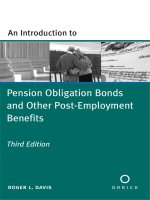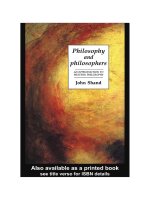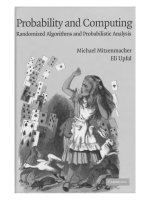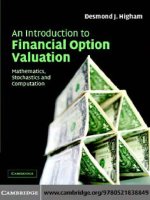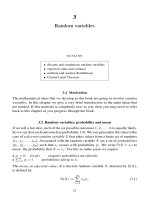levine - wealth and freedom; an introduction to political economy (1995)
Bạn đang xem bản rút gọn của tài liệu. Xem và tải ngay bản đầy đủ của tài liệu tại đây (6.26 MB, 201 trang )
Wealth and freedomWealth and freedom
An introduction to political economy
DAVID P. LEVINE
University of Denver
CAMBRIDGE
UNIVERSITY PRESS
Published by the Press Syndicate of the University of Cambridge
The Pitt Building, Trumpington Street, Cambridge CB2 IRP
40 West 20th Street, New York, NY 10011-4211, USA
10 Stamford Road, Oakleigh, Melbourne 3166, Australia
© Cambridge University Press 1995
First published 1995
Library
of
Congress Cataloging-in-Publication Data
Levine, David P., 1948-
Wealth and freedom : an introduction to political economy / David
P. Levine.
p.
cm.
ISBN 0-521-44314-8. - ISBN 0-521-44791-7 (pbk.)
HB171.5.L657 1995
330-dc20 94-31495
A catalog record for this book is available from the British Library.
ISBN 0-521-44314-8 hardback
ISBN 0-521-44791-7 paperback
Transferred
to
digital printing 2002
Contents
List
of
figures
and
tables page
vii
Preface
ix
Introduction
1
I
Economy and society
1 The place of the economy 11
2 Needs and wants 20
II Capitalism
3 Capitalism 37
4 The self-regulating market 48
5 Creative destruction 58
6 Labor 65
III Inequality and difference
7 The classical argument for inequality 77
8 Income and productive contribution 88
9 Rights and the market 99
10 Poverty and inequality 114
IV International society
11 International inequality 127
12 International society 152
v
vi Contents
V Individual and community
13 The limits of the market 163
14 Private ends, public good 174
References 185
Index 189
Figures and tables
Figures
4.1 The circular flow of economic life
page
52
4.2 Manufacturing capacity utilization rates 55
6.1 Average weekly earnings, nonfarm 67
6.2 U.S. unemployment rates 69
7.1 Education, employment, and income 79
10.1 Percentage of persons below the poverty line 116
11.1 Intraindustry trade between the United States and
Canada 136
11.2 Hourly compensation index 143
Tables
11.1 National differences in life chances 128
Vll
This volume developed out of lectures I gave in an undergraduate core
course taught over a number of years at the University of Denver. My
experience with that course taught me something about the difficulties of
teaching and learning and about the pitfalls of writing for the purpose of the
general education of students.
In my core course I introduce students without background in economics
to long-standing themes and ideas of political economy. Today, interest in
issues of political economy runs high. The challenge in teaching is to trans-
late an interest in issues into an interest in understanding the larger frame-
work of economic life that spawns those issues.
As it turned out, the book is well suited for only a part of its original
audience. Students, and readers more generally, vary in their interest in and
patience with the broader concerns emphasized here. Those with an interest
in the framework of our thinking about the economy, especially its place in
the larger fabric of our social lives, should find this book of value.
In recent years the term political economy has taken on breadth and
diversity as interest in the subject has grown substantially. This book does
not attempt to mirror either the breadth or diversity of contemporary work
in political economy. It speaks from only one of its corners - originally Adam
Smith's, although in his day it was a larger part of the whole than it is today.
The approach adopted here bears the influence of many economists who
were inspired in different ways by the ideas of Smith and his great followers,
especially Karl Marx and John Maynard Keynes.
In the following pages I introduce a way of thinking about the workings of
a capitalist or private enterprise economy. I do not attempt to compare
approaches or present doctrines. I am not of the belief that clear thinking
develops well in a cacophony of point counterpoint. The main value this
book has is for those interested in a connected narrative written within one
(synthetic) framework. My hope is that, though it draws on different
ix
x Preface
sources, it has the virtue of an integrated whole that might provide the
reader with help in making sense of important issues.
Acknowledgments
I
would like to thank
a
number of colleagues for their comments and sugges-
tions on earlier drafts of this book: Robert Blecker, Harry Bloch, Jack Don-
nelly, Naeem Inayatullah, Tracy Mott, Jane Knodell, Carol Heim, Nina
Shapiro, Nawfal Umari, and Pam Wolfe. Lee Repasch and Tom Scott pro-
vided valuable research assistance. Several anonymous readers provided
helpful suggestions. I am also grateful to Emily Loose and Alex Holzman for
their work on this project.
Introduction
The world we live in places special emphasis on private affairs. We have
organized our social institutions, especially our economies, to facilitate the
pursuit of private interests. In this world we think of the things we accom-
plish in our lives in a special way: They are primarily our own accomplish-
ments, and they are meant to serve our private ends.
At the center of this private world is a system of private property. More
than anything else, we need private property to satisfy our wants. The prop-
erty system is one of producing, consuming, buying, and selling. This is the
system we have come to refer to as our economy. It is a private property,
private enterprise, market-centered economy.
Political economy studies the properties of this private
world:
How does it
work, and how well does it satisfy our wants? What does it mean to us, and
how does it form our lives and shape the ideas we have about ourselves?
And, perhaps finally, what are its limits? After all, the world of private affairs
is not our whole world - or is it?
Many argue that the world of private affairs can and should be the whole
of our (social) world. They argue that the public dimension of our world
ought to be as narrow as is consistent with making the private secure. Echo-
ing Adam Smith, they argue that our government should limit itself to
domestic and international security and to a few public works essential to
economic intercourse but unlikely to be provided by private agents acting in
their own interests.
What, then, are the limits of the world of private affairs? When must we
have recourse to a public authority - government - because the private
associations we create and the private transactions we engage in are either
not enough or the wrong thing? When, moreover, is our self-interest a
matter of public concern, and when can and should it be left entirely up to
us?
Our answers to these questions depend on three broad considerations.
First, they depend on how we judge self-interest, whether we consider it a
1
2 Introduction
virtue or a vice. The political economy I explore in this book does not
consider self-interest a vice, although neither does it consider private ends
the only ends. Second, the answers depend on how we understand our life
together. Should it be limited, so far as possible, to private associations and
transactions, or is more needed? How do our public and private lives interre-
late? Finally, our answers to these questions depend on how we judge the
functioning of the property system, especially the market. How does it work?
When does it work well, and when does it not? What can it accomplish for
us,
and what must we accomplish in other ways?
These are questions for political economy. In the words of the greatest
critic of political economy, Karl Marx, political economy studies the "anat-
omy of civil society." By civil society, Marx had in mind what I have referred
to as the world of private affairs. Civil society is the system of human interac-
tions ruled by self-interest and the use of private property to serve
self-
interest. This is the world of political economy, viewed always with an eye to
its limits.
In order to explore this "anatomy of civil society," I develop some rudiments
of
a
theory of market economy, one that I hope will be reasonably accurate
and provide a foundation for answering some of the questions just posed.
The theory
I
construct here highlights three interconnected themes of politi-
cal economy, themes that focus the discussion of the limits of the world of
private affairs: market economy as an engine of economic development,
market economy as a foundation for liberty, and the problematic status of
labor in market economy.
Adam Smith begins The
Wealth
of Nations with a theme regarding eco-
nomic development, or the passage from the "savage state of man" to
"civilized society." He begins by asking what differentiates these two states
and how might we successfully pass from one to the other. This theme
concerning development is taken up with considerable energy and brilliance
by Karl Marx, who, while recasting the theme in his own language, con-
tinues to make it central to political economy. What makes some rich, others
poor, some nations wealthy, others not? When political economy addresses
these sorts of questions, it makes development its central theme. I have done
so as well in the following.
Many refer to the goal of economic development as justification for the
use of private property in the pursuit of private interest. Those who do often
argue that the pursuit of private gain is the only motivation at all likely to
bring about development from poverty to wealth. They justify the free mar-
ket system on the grounds that unfettered pursuit of self-interest will bring
prosperity by assuring the strongest possible link between contribution and
remuneration.
Introduction 3
The first theme concerning development leads the classical thinker natu-
rally to the second concerning liberty. Liberty is both a theme and an argu-
ment. The argument claims to show how a certain kind of liberty, the liberty
of commerce, will solve the problem of how we, individually and as a nation,
make the passage from poverty to wealth. This peculiar sort of liberty frees
us to own and use private property in labor and in means of production (or
capital stock) to pursue our private ends. In this book I introduce some of
the conceptual and analytical tools economists use to argue for and against
free trade, the liberty of commerce, as a solution to the problem of economic
development.
But the theme of liberty is not just about how we go from a savage state to
a civilized society; it is also about why we might want to do so and what we
might expect to accomplish. For the classical economist, development
means the growth of wealth, and civilized society means wealthy society.
Wealth bears heavily on our freedom. Wealth is important not simply be-
cause it assures that our basic needs will be met but also because a measure
of wealth is necessary to assure our autonomy. In Chapter 21 try to indicate
why this might be the case. If it is, we can only be free in a wealthy society,
which does not, of course, mean that if we happen to be in a wealthy society
we must be free.
Liberty is, then, both means and end. But the liberty we think of as means
is not clearly of the same order as the liberty we think of
as
end. The liberty
we think of as means is the liberty of commerce - in short, free trade. It is the
liberty of individuals, and corporations, to own the nation's capital stock as
their private property and use it to their advantage. Private ownership of
society's productive resources is the hallmark of the kind of liberty political
economists have claimed will lead to economic development.
The liberty we think of as the end has more to do with individual
self-
determination, integrity, and responsibility. The theme centering on liberty
speaks about our aspirations, individually and collectively, to assure the
conditions needed to sustain our independence of action and initiative.
Liberty has to do with the opportunities that society affords us to determine
who we are and how we will lead our lives. Wealth allows us to develop and
exercise our autonomy and individuality. With enough wealth to support
our freedoms, we can take on the burden of responsibility for our lives.
Political economy concerns itself with the framework of individual responsi-
bility and its limits. Wealthy society provides opportunity and demands that
the individual take responsibility for him- or
her-self.
Liberty links up with
responsibility.
This link introduces our third theme. Capitalist economies treat the indi-
vidual's capacities as commodities to be bought, sold and therefore valued in
markets. The term labor market refers to the set of exchanges trading
4 Introduction
capacities for money. But not only are our capacities valued in markets and
treated as commodities, their value in the market
is
the main determinant of
our income and welfare. Because liberty depends on wealth and wealth on
income, we must investigate the treatment of our capacities as commodities
if we are to understand the implications of the market system for liberty.
The connection between the labor market and individual liberty, of
course, goes beyond the way our access to wealth depends on the value of
our capacities. Our ability to sell our labor for a wage or salary means that
those capacities are ours in a special sense - they are our property. No other
person or institution has the right to determine who
we
work for or what sort
of work we do. This is also an important kind of liberty, although it is not
without its hazards. When we have only the income from selling our
capacities to live on, and when the market for those capacities is limited, our
opportunities are limited. In many cases these limitations restrict our free-
dom more than they enhance it. Political economy can illuminate the com-
plex relation between freedom and treating our capacities as commodities.
The treatment of labor as a commodity also has implications for the
theme of development. The dependence of income on the sale of laboring
capacity links income to production cost of which labor cost is a major
component. The higher our wages and salaries, the higher our income; the
higher our income, the more we can buy from those who hope to make a
profit by selling things to us. At the same time the higher our wages and
salaries, the more it costs those who hire us to help them produce those
commodities. This means that the cost of labor
has
complex implications for
the process of economic growth and development.
The connection of wealth to liberty makes wealth important and develop-
ment worth the trouble. And trouble development most certainly is. The
trouble arises because what
we
accomplish by development comes at a cost.
This is also an important theme. Economic development is a social or na-
tional goal. It requires a vast mobilization of society in its service. Of those
mobilized, only some, at times a small proportion, benefit much by it. The
benefits become widespread only later. How we make development a goal
matters.
The classical economists thought we could do so simply by setting indi-
viduals free to pursue their private interests as they perceived them. If we
liberate commerce to pursue the goal of making the most money possible,
then those engaged in commerce will do those things that lead to economic
development. And, even though they appropriate a goodly share for their
own personal use, they still devote a great deal of society's product, which
they own
as
their private property, to building up capital stock for the future.
Many have doubted that economic development can be accomplished as
the unintended consequence of private self-seeking, arguing instead that it
Introduction 5
must be made an explicit objective of government policy and that govern-
ment must direct and regulate the economy
so
as to assure that resources are
well used. I explore some dimensions of
this
debate in the following pages.
The debate has to do with the limits of liberty, at least of the liberty of
commerce. It has something to do as well with ends of government. These
ends express how our nation understands its common or collective purpose,
or in an older language, the public or common good.
Political economy has its own way of thinking about the public good, one
that focuses attention on private ends. That is, political economists often
think the public good consists of the sum of private goods. The public good
refers,
then, to what benefits each of
us
individually by enhancing our wel-
fare through increasing our real income. This line of argument links the
public good to the end of economic development, which enhances the abil-
ity of the economy to provide for the material well-being of citizens.
Public policy
is
often discussed with an
eye
to its consequences for
the
size
or growth rate of the national product, the level of income, or the rate of
employment.
We
judge policy by its impact on economic performance. This
makes sense; but it is also in some ways limiting. Other criteria matter. The
habit of judging public policy by economic performance shifts these other
criteria into the background. Consider the example of education.
Concern over failing competitiveness and slow productivity growth leads
some observers to advocate more government involvement. Thus more
spending on education
will,
it
is
argued, improve our stock of educated labor
capable of scientific discovery and application while raising the skill level and
productivity of the work force. Government's education policy becomes a
part of its economic policy. This makes impact on economic performance a
measure of the success of social policy.
Defining problems in this way
is
consistent with making economic growth
and development the objectives of public policy. Doing so opens up an
important and valuable line of investigation. But, taken by
itself,
it
leaves
out
a vital dimension and distorts our understanding of the role of government.
The part left out has to do with considerations of social justice. Concern for
social justice can guide economic policy in directions different from those
that follow concern for economic performance.
Concern with social justice directs attention to the idea of individual
opportunity. Development refers to the path toward social arrangements
that assure to all persons, so far as possible, the array of opportunities
needed for individual self-determination. Without employment and in-
come, the individual's effort to realize his or her capacities must be seriously
impaired. Thus economic policy aimed at economic objectives has its place.
But the underlying justification for policy is not narrowly economic.
A
better educated labor force may indeed be more productive (although it
6 Introduction
may also exhibit some qualities that work against productivity). But this
does not make productivity the justification for government spending on
education. A more compelling argument for investment in education holds
regardless of
its
consequences for productivity. This argument links educa-
tion to opportunity for individual self-determination.
Of course, if the point is to lobby for spending on education, why not
appeal to a (perhaps dubious) relation between education and competitive-
ness if you think that argument might succeed? The result would seem to
serve the cause of justice as well. But perhaps it does not. By employing
economic arguments for social policy, we reinforce the idea that the role of
government should be limited to making the market work better. This lim-
itation can have damaging consequences. If it turns out that better schools
will not enhance our productivity, the economic argument works against
educational expenditure and thus against our concern for educational op-
portunity as a part of a movement toward greater social justice.
One way of expressing the difference between two ways of thinking about
the role of government uses the language of rights and welfare (see Levine
1983a). Political economy carries on its arguments over policy in the lan-
guage of welfare, loosely speaking of material well-being. This language is
important, and concern over welfare is a legitimate end of political economy.
But that concern needs to be carried forward into the context of
a
concern
for individual rights and integrity. Concern for rights is not automatically
met by improvements in welfare. Welfare and rights are not in fundamental
conflict, but they are different. Each needs to be taken into account in a
discussion of policy and the role of government.
Thinking this way connects two of the themes of political economy intro-
duced earlier, those involving liberty and development. Placed within a
context of concern for social justice, the expansion of freedom is the end of
development. This makes policy in the interest of development subordinate
to concern for justice, just as it makes justice the most powerful argument
for development. In concern for social justice, we also have our most power-
ful argument for limiting the market and the process of economic develop-
ment (i.e., when they threaten to damage justice and self-determination).
The considerations briefly introduced in this introduction suggest one
other important dimension to debate in political economy. We normally link
opportunity to equality by speaking of opportunity for all as "equal oppor-
tunity." Defining development as I have here must make concern over
equality and inequality central. After exploring the core ideas of political
economy concerning the workings of
a
market economy in Parts I and II, I
turn to an investigation of the various arguments regarding equality and
inequality.
Introduction 7
I begin, in Part I, with an exploration of the idea of
a
self-standing economy
and with the problem of the use of wealth. I attempt in this discussion to
raise the core issues of political economy. In Part II I outline the basic
features of a capitalist or private enterprise economy, which has been as-
sumed by virtually all students to be the appropriate form of economic
organization to assure the growth of wealth. This system exhibits a signifi-
cant degree of inequality of income and wealth among citizens; and in Part
III I consider the arguments advanced to justify inequality under capitalism.
Part IV considers a set of related matters within a global setting, including
questions of the role of the market, the roots of international inequality, and
the emergence of global society. Part V considers arguments that justify
setting limits on the free market and on the role of pursuit of private ends in
organizing our social lives.
The economy
We
no longer know what to do with our economy. Will lowering taxes on the
wealthy increase incomes and employment or simply enrich the wealthy? Do
welfare programs and income supports assure well-being and meet our
obligations to our fellow citizens? Or do they weaken the incentives to work
and save, incentives that underpin prosperity?
Underlying such questions as these are broader uncertainties that moti-
vate political debate and strain the social fabric, questions that have to do
with the place of the economy in the larger social order. Does our economy
work best when attended to least? Should management of economic affairs
be more firmly attached to public ends and explicit strategies for achieving
them?
Bill Clinton began his presidential campaign with a proclamation of faith:
We
believe in the
free
enterprise system and the power of market forces.
We
know
economic growth will be the best jobs program we will ever have. But economic
growth does not come without
a
national economic strategy to invest in people and
meet the competition. (Clinton
&
Gore 1992,
p.
6)
Adam Smith, writing in 1776, also believed in the power of market forces
and that encouraging economic growth was the best way of securing em-
ployment. But he did not share Clinton's conviction that a national eco-
nomic strategy was needed to secure economic growth and prosperity.
The debate over the best means to secure the growth of wealth has raged
more or less continuously for more than two hundred years. In reviewing
this history it sometimes seems that our uncertainty about the economy
is
all
uncertainty about
means.
But I do not think this is correct. Serious thought
about ends is also needed. In the following I hope we can learn something
about what troubles our economy by focusing on ends rather than means.
11
12
Wealth
and freedom
The uncertainty I refer to is not new. What to do with the economy has been
a problem since we first became aware that we had one. Our awareness of
the economy is, however, a fairly recent development.
Ancient societies engaged in what we might call economic activities. They
produced and distributed the things needed to satisfy their members' wants.
In doing so, they were sometimes more, sometimes less, successful, depend-
ing, for example, on the weather. Moving a step further back in history,
primitive societies also went about trying with varying success to acquire
what their members needed. Neither the ancients nor the primitives, how-
ever, spent much effort pondering what to do about their economies. Some
did not even have a word for economy on which to focus their pondering.
Even if they had some words they could use, they had no real reason to
concern themselves with the recondite matters that now confuse us about
economy. They did not have fiscal deficits, economic indicators, or eco-
nomic policies.
1
They did not have economic doctrine because economic
doctrine cannot "exist without the prior concept of
c
the economy'" (Finley
1973,
p. 155).
Another way to say this is to notice that premodern society did not sepa-
rate the economy from the flow of daily life. It was not something distinct: a
different place, a different way of doing things, or a different purpose for
doing things. No one would have spoken then, as for example, Bill Clinton
did in his 1993 State of the Union Address, about what troubles "our
economy."
Late in the life of our society, perhaps as late as the eighteenth century, the
economy became something to worry about. It was no longer just what most
people did with their lives, it was an entity in its own right: a place we
sometimes go, an activity we sometimes do, a thing we sometimes think
about. I refer to this quality of the economy as its separateness.
Karl Polanyi was one of the first thinkers to concern himself explicitly with
what I call the separateness of the economy.
2
He distinguishes between
"embedded" and "disembedded" economies. The former are, so to speak,
hidden in the fabric of society; the latter are a separate and notable realm
exposed to conjecture, subject to thought and action.
The fabric in which the economy is originally embedded is the household.
The anthropologist Marshall Sahlins notes that in primitive society, "the
household makes up a kind of'petite' economy." Here "the normal activities
of any adult man, taken in conjunction with the normal activities of an adult
1
M. I. Finley observes that the work, Xenophon's
Oikonomikos,
which became the model for a
2000 year tradition of writing on economics, contains "not one sentence that expresses an
economic principle or offers any economic analysis, nothing on efficiency of production,
'rational' choice, the marketing of
crops"
(1973, p. 19).
2
See Polanyi (1957). The first to explore this idea systematically was the German philosopher
G.W.F. Hegel in his
Philosophy
of Right.
The
place of
the economy
13
woman, practically exhaust the customry works of society" (1972, pp. 78-
79).
Sahlins's description of the household economy bears little resemblance
to the world we live in. We can hardly imagine satisfying our wants if all we
can call on is the work and know-how of
ourselves,
our spouse, and perhaps
a child or two. Embedding the economy in the household, then, means
radically limiting what we can want and what we can get to satisfy our wants.
It also means isolating ourselves from the larger world. Sahlins goes on to
observe that the social economy of primitive society "is fragmented into a
thousand petty existences, each organized to proceed independently of the
others and each dedicated to the homebred principle of looking out for
itself (1972, p. 95).
This observation brings us to one of the most salient features of our own
"disembedded" economy. Members of household economies depend on
their relatives to help in acquiring the things needed for daily life. They have
a close relation to a limited group of others responsible for securing the
family's survival. Today, we depend on those we have no close relations with,
people we do not know, strangers rather than relatives.
The term political economy was introduced in the eighteenth century to
distinguish the new boundaries of economic life: "What oeconomy is in a
family, political economy is in a state" (Steuart 1966/1767, p. 16). Refer-
ence to political economy puts us on notice that economic affairs take place
among strangers rather than relatives.
We do not produce the things we consume; they come from other regions
and
nations:
cars from Germany, Japan, or Korea, sweaters from Italy, shirts
from Singapore, smoked oysters from Thailand, cheese from France or
Britain, beer from Australia. They are produced by people we do not know.
Aside from buying their products, we may have little relation with them. If
they are fellow citizens, we share that much common life; if they are not,
buying and selling may be virtually the whole of our connection.
Yet, in buying their produce, we enter into a significant relation with
them. Not only do money and goods circulate but also ways of
life.
We have
access to different cultures, and we can, in however limited a way, partici-
pate in them by feeling their influence in the things we use. We are more
separate from those we depend on because we do not know them, but we are
also better connected because we come to share more of our lives with them.
We lose some of the isolation of the household economy.
Considered on the global level, the United States has felt this loss of
isolation less powerfully because of the special influence American culture
has had worldwide. Wherever we are in the world, we can eat at McDonalds,
watch American television shows, drive American
cars.
Part of the reason for
this is the dominance of the U.S. market. Its size makes it profitable for
14
Wealth
and freedom
producers abroad to adapt to it rather than attempt to adapt it to the kinds of
goods they might produce for their own citizens. A second reason is the
political and cultural influence of the United States across the globe. This
influence has made a disproportionate amount of global culture American
culture. As a result we have benefited less from exposure to other cultures
than they have from exposure to ours. The world market opens all partici-
pants to a marketplace of cultures, but it has done so asymmetrically. As the
global predominance of the United States wanes, this asymmetry should
weaken and our culture should open up to influences from around the world.
Clearly, our economy is no longer synonymous with our daily routine.
The members of the household were their economy, the daily life of the
household its economic activities. For us, by contrast, though we may buy,
sell, and work, our economy exists with or without us. It is separate from us.
In Polanyi's language, the economy is now disembedded.
Because the economy is disembedded, we need to think about what to do
with it. Thinking what to do about the economy spawned the discipline of
political economy in the eighteenth century. One of the founders of political
economy, Sir James Steuart, describes it this way:
The principal object of
this
science is to secure a certain fund of subsistence for all
the inhabitants, to obviate every circumstance which may render it precarious; to
provide everything necessary for supplying the wants of society, and to employ the
inhabitants (supposing them to be
free
men) in such
a
manner
as
naturally to create
reciprocal relations and dependencies between them, so as to make their several
interests lead them
to
supply one
another with their
reciprocal
wants.
(1966/1767, p.
17)
Steuart believes that in order to satisfy wants, we will need to know a sci-
ence. Evidently, the economy is a thing we do not know as much about as we
need to if we are to prosper. If economy consisted of a man and woman
producing their subsistence, this knowledge would hardly be necessary.
The question of control becomes important when the economy is disem-
bedded. The members of the household economy had a kind of control,
although forces of nature could easily overwhelm what control they
had.
But
they did not have an economy to control. Economy was the stuff of their
lives;
it was what they did. It was not something to control. Perhaps the male
head of the household ran the show in the primitive economy. But, if he did
control others, this does not mean that controlling the economy was his
concern.
Concern about control goes together with the prospect that something
might get out of control. This is a concern that comes our way with the
emergence of the economy. Our dependence is no longer simply on our-
selves but also on others and on "the economy."
The
place of
the economy
15
Our welfare depends on the price of oil, which depends on decisions made
by strangers. But even that observation misses the main point. Our welfare
depends not only on the decisions of strangers but also on the workings of
the thing we call the economy. What the economy does to and for us de-
pends on decisions others make, but it is not decided by them. All those
decisions to buy and sell, save and invest, work and not work, add up in ways
unintended and unpredictable.
We may talk about our economy in the way we talk about our cars. When
something goes wrong with our car, we need to get it fixed because we
depend on it. But we do not need to change ourselves to fix our cars. Or we
may talk about our economies in the way we talk about our bodies. Some-
times we can get our bodies fixed without changing ourselves, but some-
times we cannot. Sometimes getting along with our bodies means changing
ourselves.
If a disease or accident takes away our ability to walk, dealing with that
change in our body demands some change in ourselves. We must see our-
selves in a wheelchair rather than walking, and this can change our perspec-
tive on the world and our place in it. As we age, changes in our bodies
demand that we change our images of ourselves and the way we live. We may
continue to have an image of ourselves as young long after we have turned
the corner into middle age. This false self-image can get us into trouble,
leading us to attempt things we cannot do or behave in ways not appropriate
for us. We may sense that something is wrong. To fix what is wrong we must
change the way we see ourselves.
Is our relationship to our economy like that to our car or like that to our
body? When our economy fails to work right, does this imply that something
is wrong with the way we lead our lives or imagine ourselves?
Economists have come to think about the economy mainly as though it
were like a car. They believe their expertise gives them the skill to fix it
without significantly touching the lives of those who use and depend on it.
Of course, fixing our economy will make our lives better, but it does not
make us different. Many critics dispute this judgment. They believe we
cannot fix the economy without changing ourselves, although there is not
much agreement on the changes needed.
Many today think we need to be more self-denying. We need to make
sacrifices, get less, save more. We cannot continue to be the people we have
been if the economy is to work well. Ross Perot drew support with this
sentiment during the 1992 presidential election campaign. The winning
candidate and his other opponent reassured the electorate that they need
not change themselves to fix their economy. They believed the economy was
more like our car than our body.

